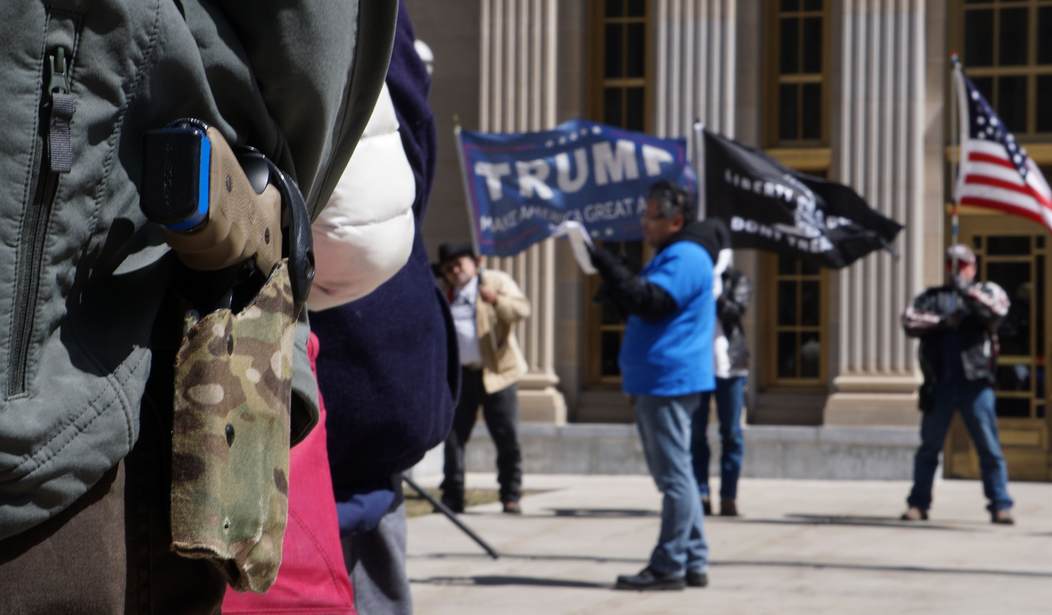Defiance . . . nullification. It is a trend.
I take it as a sign of our contentious times that we now witness states in open rebellion against centralized control from the Imperial City of Washington, D.C., while cities and counties are also rattling the chains set by their respective state capitals.
The sweep of marijuana decriminalization and legalization is only the most obvious. Gay marriage became a legal mandate set by the Supreme Court only after several state legislatures, initiative measures, and courts took the lead on the issue. The Supreme Court has not weighed in on marijuana in an analogous way yet. But Congress is slowly climbing on board the marijuana legalization train — in defiance of Attorney General Jeff Sessions’s obvious itch to attack states for not toeing the prohibitionist line. The most recent noise on this has been made by Senate Minority Leader Chuck Schumer, who has “announced his intention” to work on legislation to decriminalize cannabis.
“So why have I changed my stance? Looking at the numbers helped,” Schumer announced on April 20. “Two thirds of Americans believe marijuana should be legalized, meanwhile more than half of all drug arrests in the United States are marijuana arrests.”
The rise of “sanctuary cities” defying federal government immigration laws — often backed up by state legislatures, and in California the whole state has gone into open rebellion against federal law — has been a contentious issue, with progressives supporting this sort of nullification and conservatives opposing it.
But some of the latest developments do not hail from the left.
First off, some California cities and counties are pushing back at the state mandate to not cooperate with the INS. This is a rebellion against a rebellion.
Recommended
And in Illinois, a similar pushback has come from the counties — but on a different issue.
The subject matter? Firearms.
A number of rural governments have taken a cue from the immigration debate by “declaring themselves sanctuary counties for gun owners,” we learn from the AP’s Don Babwin, writing in the Chicago Tribune.
“The resolutions are meant to put the Democratic-controlled Legislature on notice that if it passes a host of gun bills,” writes Babwin, “including new age restrictions for certain weapons, a bump stock ban and size limit for gun magazines, the counties might bar their employees from enforcing the new laws.”
An Effingham County Board Member calls “sanctuary” an attention-getting “buzzword,” reporting that “at least 20 Illinois counties and local officials in Oregon and Washington have asked for copies of Effingham County’s resolution.”
He says they “want to make a statement. We don’t want our Second Amendment rights to be stripped away from us.”
The shoe is on the other foot in Florida, however. There it is the state government — dominated by Republicans — that is putting something of a brake on the urge to regulate and prohibit gun ownership and possession. The state does not allow counties and cities any say in regulating firearms. But after the Parkland shooting, at least one local governing body passed a stricter-than-the-state’s regulation. The mayor of Coral Gables called the state Legislature “cowardly” and sell-outs to the NRA. “And it takes cities,” he said, “or individuals or communities such as ours to do something.”
And the City Council did. And quickly regretted it. The mayor had been prepared to withstand legal action from the state to defend his law, but a local gun collector made everyone take a step back. “If you pass this law, we will sue you,” he said. “Chances are, as your own city attorney has told you, we will win. And you will end up paying not just your attorney’s fees, but you’ll be paying our plaintiffs’ fees as well.”
So the city backed off. And then allied itself with a number of other low-level Florida governments to sue the State.
In both Illinois and Florida, things do not look well for the local resistance. You see, cities and counties do not have an analogous relationship to their state governments as do states to the federal government: the states created the “United States of America,” while cities and counties are also state creations.
That is, we live in the “United States” not in the “United ‘United Counties’ of America.” States are sovereign; cities and counties and metropolitan governments all exist at the whim of their states, as corporations.
Yet this whole trend is important. It shows a growing recognition of the tyrannical nature of centralized power.
And the usefulness of decentralization.
But decentralization is not the be-all and end-all — it doesn’t solve every problem. If some people regard owning guns a right and others regard it as an assault on civilization, there is no easy fix to the disagreement.
Still, it is good to see both left and right recognizing merit in not pushing every dispute up to the federal level. After all, a limited federal government was the original conception of our federation. The states make the union. The union does not make the states. We can quote a long list of founders who agreed with that, not least of all Thomas Jefferson and James Madison.
“I have long believed that states should function as their own laboratories of democracy,” said Senator Schumer.
I do not remember this federalist, decentralist attitude coming to play previously from this particular politician. But it is good to see him get on board.
For at least one issue.
Maybe we should hold his feet to the fire of this logic when some other issue bubbles up into the upper house.
You know, like health care. Or abortion. Or . . .

























Join the conversation as a VIP Member